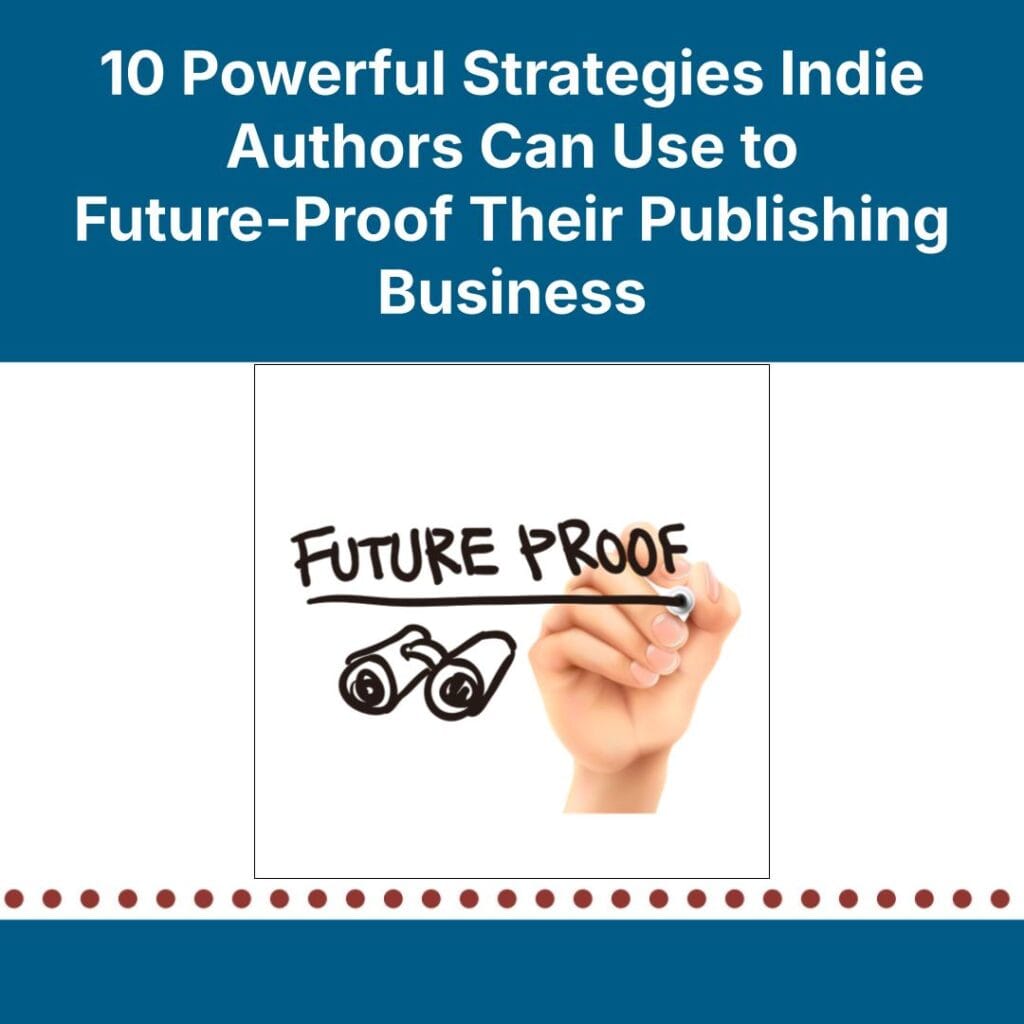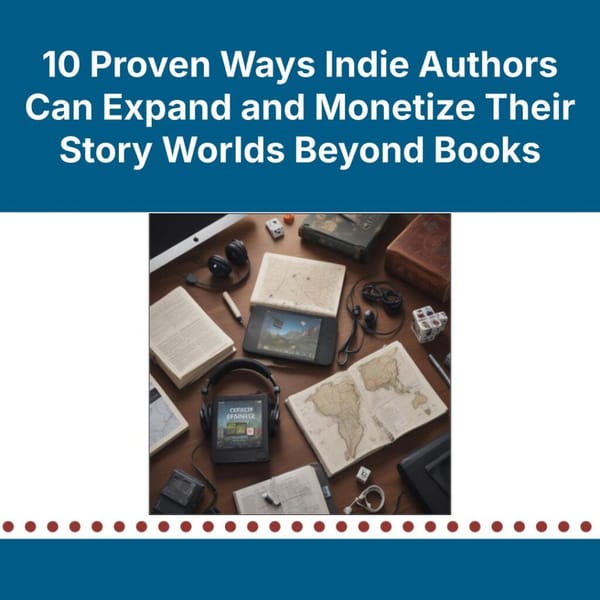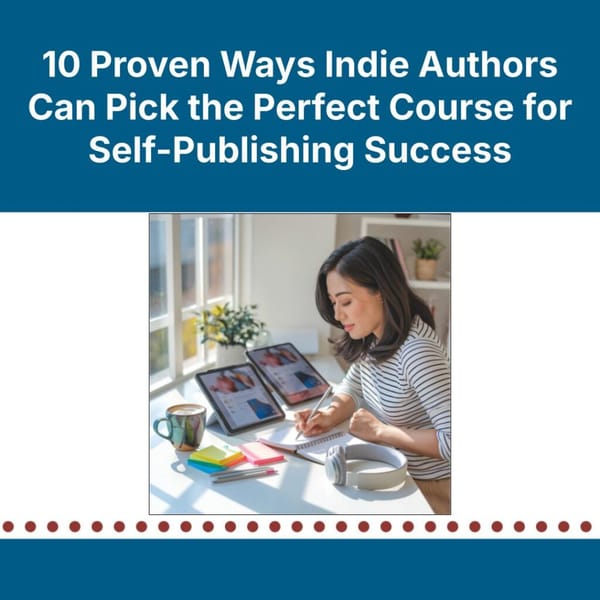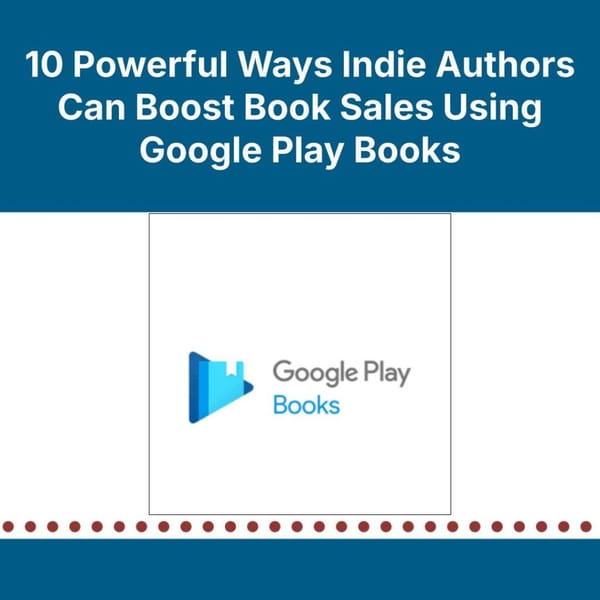The world of indie publishing has been evolving at a breakneck pace, and today, authors are more cognizant of the future of their business than ever before. Old strategies are being renewed, newer strategies are being restructured, and all around, authors are not only considering the future of their book business but also how to add a few levels of security to their business model.
As algorithms and policies shift and third-party platforms make decisions that ripple outward to affect the indie authors who use them, many authors are choosing to protect their business by moving away from “rented land.” Instead, they are shifting toward a direct sales model, where they have the control, where revenue streams are expanded, and where they can be less susceptible to sudden changes in the industry. But securing your business for the future doesn’t have to happen all at once. Read on for ten steps you can take to begin future-proofing your business today, no matter what the road ahead has in store.
Write for Merchandise.
Today, more authors are looking beyond the book as they write. What was once considered an afterthought is now becoming a model for pre-planning the success of a particular story. Authors are writing books with merchandising in mind. If a book attracts enough attention, it can broaden into amusement parks, clothing lines, movies, video games … all designed after the wild success of books.
Indie authors are seeing the book as not the start of their customer’s journey but the overarching theme. Willow Winters’s subscription book boxes are stuffed with merchandise that reinforces the message of sex positivity shared in her books. Authors should look for opportunities to sell beyond the book, using their IP as a guide for producing things readers want, so they are creating not just a book but a world.
Build Your Business Savings Account—of IP.
Indie authors are no stranger to writing quickly, but who’s to say a book has had its time and is no longer capable of finding new customers or generating cash flow? Authors focused on direct sales have a massive opportunity to present the curious reader with what they believe they will most enjoy, and this means pushing their backlist titles on their sales platforms as well. Upsells (“Would you like fries with that?”), down sells (“Too expensive? Here’s a bargain.”) and cross-sells (“Readers also bought this.”) are all tools you can utilize to push your backlist titles to frontlist customers and generate more revenue and readership overall.
Your Ads Still Matter. All of Them.
Which platform is king of the ads? X? Meta? Pinterest? What about all of them?
Just as an author should diversify their marketing methods, they should also diversify their advertising methods. Nothing in the terms of service on any of these platforms says their ads won’t work for authors or that Facebook and Amazon ads are the only options. There are two key factors to keep in mind when examining other-than-usual advertising platforms.
First, each of these platforms has a financial incentive to get more of your advertising dollars. They want you to succeed, make sales, raise your budgets, and grow. The advertising platforms are on your side, and that is a good feeling when it comes to testing out new avenues for finding readers.
The second factor is the one wholly in the author’s control: the messaging. What message are you sending the reader that would make them want to buy your book? If the platform is on your side, then all you’re lacking is the right messaging.
Leverage Your Biggest Winners.
Double down on what’s working. If it’s not broken, don’t fix it. Follow the money. These phrases all mean the same thing: If something is working, keep at it. Nothing future-proofs your business more than recognizing something is working and allowing it to do so. But what you do after you realize something is working is what’s most important. When you notice something boosting your business, study and learn why it is working. Is it the style of writing? The ad copy? The cover? Try to put yourself in your reader’s shoes, and ask why they bought this book above all others. Then, double down on that thing.
Create New and Improved Offers.
Why should a reader pick your book? If you sell exclusively on third-party retailers, there are likely dozens like it, all on the same page.
Authors selling direct have the opportunity to do what others exclusive to third-party retailers cannot—and that’s modify the offer. On your website, offer your readers deals that are so good they’d be dumb not to take them. Is that 15 percent off? How about a free ebook and audiobook with every purchase? What about a “buy one, get one free” deal? Authors selling direct need to find the offer that best speaks to their readers to ensure they keep coming back to them.
Generate Endless Ideas.
What if you told your story through letters? What about animated comics? How about if your novel came disassembled, and the reader had to put it together like a puzzle? Generating endless ideas is not about having a bunch of good ideas; it’s about having a lot of bad ideas until you find one that sticks, then using that to diversify your cash flow. Authors everywhere are starting subscriptions, alternate-reality games (ARGs), story letters, and more. Then, they’re writing the book on top of it as another product. There are endless possibilities for what authors can create with their stories, and each one of them has the potential to future-proof their business by being one of many products based on a single piece of IP.
Outsource the Time-Sucks to Focus.
An author’s greatest opportunity is in their ability to create worlds no one else can. Sometimes, however, they get so caught up in the minutiae that this part of them takes a step back.
Creating worlds is your point of greatest leverage and impact on a reader. If something is taking away from that, don’t be afraid to outsource it. Hire an assistant or team to perform the mundane time-sucks that keep your business running, so you can focus back on what matters most: telling great stories.
Create in Public; Sometimes the Process Is Worth More than the Product.
Authors are interesting creatures. Most are introverted, creating in a vacuum and only coming out of their writing cave when necessary. But there’s missed opportunity in the time they’ve already invested in their writing, and that’s putting that interest on display. Scroll social media for a few minutes, and you’ll stumble upon a small business owner power-washing a sidewalk or mowing a lawn. Those acts alone may pay the bills, but there’s also a reason they’re spending the time recording themselves: because it’s interesting. Interest means attention, and attention means opportunity to monetize that attention.
Authors should consider following suit and creating in public. Document your journey, your process, and your joy in writing, and not in a way that’s meant to instruct but in a way that brings you and your viewer closer. In doing so, your channels and opportunities to create alternative sources of income will grow as well. Plus, you may find some new readers in the process.
Partner and Collaborate to Dominate a Space.
What’s better than one author? How about multiple authors? Years ago, authors could band together to dominate the top charts and nail that USA Today bestseller title through the use of strategic marketing and large anthologies. That strategy is no longer viable for making a bestseller list, but collaborating with other authors can still lead to greater success in both businesses.
One way for direct authors to future-proof their businesses together is to work collaboratively to sell their products to the benefit of them both. How about a special: Buy my book and get my friend’s book free? Nothing is out of reach for the direct author who has total control over his customer’s journey, and this includes collaborating with other authors to offer products in ways third-party retailers don’t or can’t offer. Collaborations should be seen as a long-term investment in your brand, and in your collaborator’s brand, as both of you seek to benefit from the growth and recognition provided by the other.
View Persistence as a Tool.
Nothing is more of a surefire way to tank your business than to give up. The publishing industry can be unforgiving, but your persistence is a tool that can be utilized. Write a book, then another, then another, and try to improve each time. Try one advertising channel, then another, then another, and keep trying until you get the results you want. Persistence isn’t a trait; it’s a mindset. Authors need to be thick-skinned, persistent, and unwilling to give up when it gets hard, because only then will the world get more stories.
The Wrap-Up
Authors, specifically those selling direct, are always keeping an eye on their business. And when there’s more control in their hands, there’s also more opportunity to diversify, strengthen, and grow their business than when under the thumb of an algorithm with diminished control. Authors should see every facet of their business as a way to connect with the reader, show them what they want, and offer it to them in a way that beats out all else. Eventually, buying from them won’t be up to chance; instead, it will be such a good opportunity they’d be dumb not to take it. Future-proofing an author business requires an eye toward the future, and not just at the single sale in front of them. Make this mindset shift, and you’ll allow yourself to look at your business as a long-term investment in your own success rather than a fly-by-minute sales-generating machine.
David Viergutz
David Viergutz is a disabled Army Veteran, Law Enforcement Veteran, husband and proud father. He is an author of stories from every flavor of horror and dark fiction. One day, David’s wife sat him down and gave him the confidence to start putting his imagination on paper. From then on out his creativity has no longer been stifled by self-doubt and he continues to write with a smile on his face in a dark, candle-lit room.









